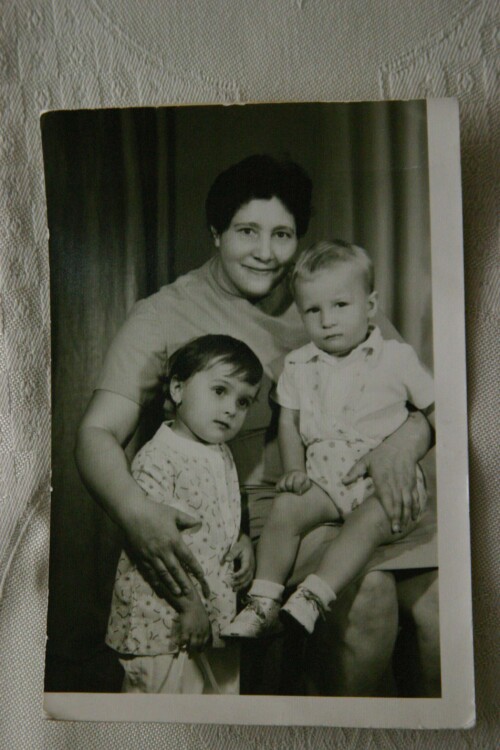
Anna Kýrová
Anna Kýrová, née Kýrová, born 1927, Strážnice, Hodonín district
-
Testimony abstract
Anna Kýrová's family of five lived in a one-room house in Strážnice right next to the cemetery, where many other Romani people lived at the time. Their houses were nice, and, according to her, “not as ugly as the ones in Skalica”.
Her grandfather was very hard-working blacksmith, who she said did not to look very Roma-like. He worked for the Count and his residence,[1] for which he received building materials for his house such as wood and bricks. He died when he was over ninety years old. Anna Kýrová said her grandmother, on the other hand, had a dark complexion and was pretty, and people liked her very much. She used to help the neighbours, such as by mowing grass, cutting straw, sweeping, and cleaning, for which she always received something.
Her mother Kateřina Kýrová was born in 1884 and married a man with the same surname. Her father, Josef Kýr, who fought in World War I and suffered from asthma, did not tolerate idleness, nor did he like the Roma and their way of life. Anna Kýrová said he was one of four brothers and they were always together. He worked as a blacksmith and had a small forge at home, where he made various agricultural tools, such as hoes, rakes, and even chains. He was tall, slim, very hard-working, and would scour dumps for iron. He also taught all his children the blacksmith's trade. She said he was a good man, but strict - everything had to be done properly, or as Kýrová says, they had to hammer the iron until it shone like gold. My father then went to sell the products, for example, in Znorov [correctly Vnorovy], where people liked him and were already waiting for him. The family was well off, they had enough money, and, as he says, they did not even have to have a pig, because my father received from the people, for example, greaves, from which they made a large pot of lard.
Just before the war, when Kýrová was twelve years old, her father died. She then went to help the peasants to earn some money. Sister Apolena, born in 1931, was still young. However, Anna Kýrová had three much older sisters, who came from her mother's first marriage (her mother's then husband died as a dragoon in the First World War): sister Antonia, called Tonka, then Maryša and finally Kateřina, called Kača or Daka/Daga, who married the renowned primáš Jožka Kubík from Hrubá Vrbka.
- [1] Probably the Magnis family, who owned the Strážnice manor and the chateau until 1945. (ed.)
During the war, Anna Kýrová was warned of her arrest by her teacher, Ms. Hudečková. However, the family was arrested anyway and taken to Olomouc, to a collection point for the assembly of the transport. The Roma from Strážnice, who were well integrated into their home village, were given the opportunity to contact their mayor by telephone, who was able to vouch for them and, as it were, reclaim them from the transport. The connection failed, however, as the mayor allegedly allowed himself to be denied. The next day, in March 1943, the family was taken to the Auschwitz II-Birkenau concentration camp.[1]
Anna Kýrová worked most of the time in the kitchen. Her cousin was put in charge of removing the dead bodies, and he had to do the same with the bodies of her mother and sister Apolena. In April 1944, Anna Kýrová was taken to the Ravensbrück concentration camp, where she worked in agriculture and excavation.[2] It is said that she was not included in the death march because the head of the camp took pity on the crying girl. He sent her to work in the salt mines at Bendvorth [properly Beendorf], where she worked in a factory producing aircraft parts. She was then interned in an unspecified camp near Hamburg, where she also served as a so-called block girl and was in charge of other female prisoners. Anna Kýrová was liberated by the American army.
She lived in Hamburg, Pardubice, Brno and Strážnice. She has worked for many years with the Museum of Romani Culture in Brno.
-
Origin of Testimony
The interview with Anna Kýrová was conducted by the Museum of Romani Culture in 1995, 2001, 2003 and 2006. The information also comes from four different research reports.
-
Where to find this testimony




